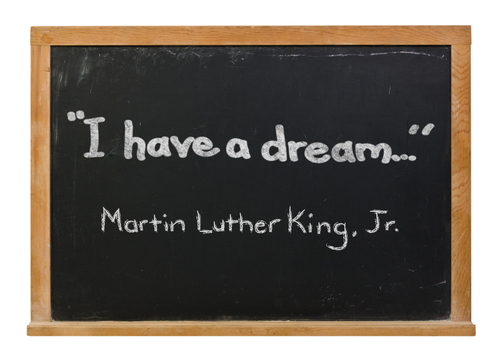
08 Mar Cuz We Love Martin
When you think about Martin Luther King, Jr., chances are good that the very first thing that enters your mind is his payments as a civil rights activist, and it’s little wonder why. Odds are also good that some of the words from his famous I Have a Dream speech surface in your mind every so often. Despite the fact that those words were first uttered over 50 years ago, the tips he gave voice to are timeless and powerful.
He visualized a world so unique from the one he lived in and committed his time and energy to working for adjustment. It’s hard to read these words and not be moved by their beauty and truth:
“I have a dream that one day this country will rise up and endure the right significance of its creed: ‘We hold these truths to be self-evident, that all men are created equal.’
I have a vision that one day on the red hills of Georgia, the sons of former slaves and the sons of former slave owners will manage to sit down together at the table of brotherhood … I have a dream that my four little children will one day live in a nation where they will not be condemned by the color of their skin but by the content of their personality… I have a dream that… one day… in Alabama little black girls and black boys will manage to join hands with little white boys and white girls as brothers and sisters.”
Martin’s words inspire a greater brotherhood, kindness, and respect among all people. They prompt one to think about the idea that character is the only rubric that truly matters and that hostility can give way to peace.
While he is distinguished and respected for his work as a great civil rights leader, his function as a faithful religious leader is often overlooked. Aside from tenaciously helping social change, he was also eager about his faith. Following in the footsteps of those who came before him, he worked and became a pastor to motivate others through sharing God’s word.
In an article on pbs.org (http://www.pbs.org/wnet/religionandethics/2006/01/13/january-13-2006-martin-luther-king-jr-as-pastor/1788/), Professor Lewis Baldwin (Professor of Religious Studies and Director of African American Studies at Vanderbilt University) said this:
“Many labels were attached to him during his lifetime. He was referred to as a civil rights activist; he was called a social activist, a social change agent, a world figure. But I think he thought of himself first and foremost as a preacher, as a Christian pastor.”
His beliefs motivated his diligent work, despite opposition and persecution that ultimately cost him his life when he was assassinated on April 4, 1968. He devoted his life to working for changes we desperately needed to see in this nation, but he did so while treating others with respect.
Let us not seek to satisfy our thirst for freedom by drinking from the cup of bitterness and hatred. Again and again, we must rise to the majestic heights of meeting physical force with soul force.”
If everyone made a conscious effort to live like that, what a different world it would be!
Ignoring the fact that MLK Jr. was a churchman is to be blind to the fact that his notions were a driving force in all that he did. Aside from becoming a widely-known public figure, he was something else long before that: a church leader, seeking to elevate, teach, and look after his flock.
The work of church pastors is still valued and necessary today. And even though creeds and beliefs vary, we are united by a brotherhood and sisterhood above the differences that divide us. The work that churches do is important, and we love being able to witness this work in individual congregations as we provide transportation for church groups. Whether you need help getting the choir to a community event, need to transport a youth group to an event, or need to shuttle groups at a local social work project, we’d love to be there to assist you!


